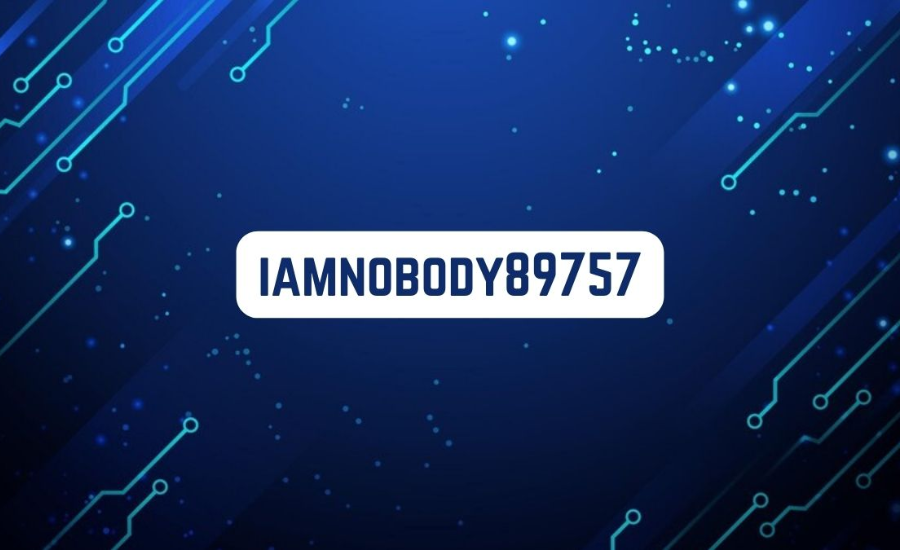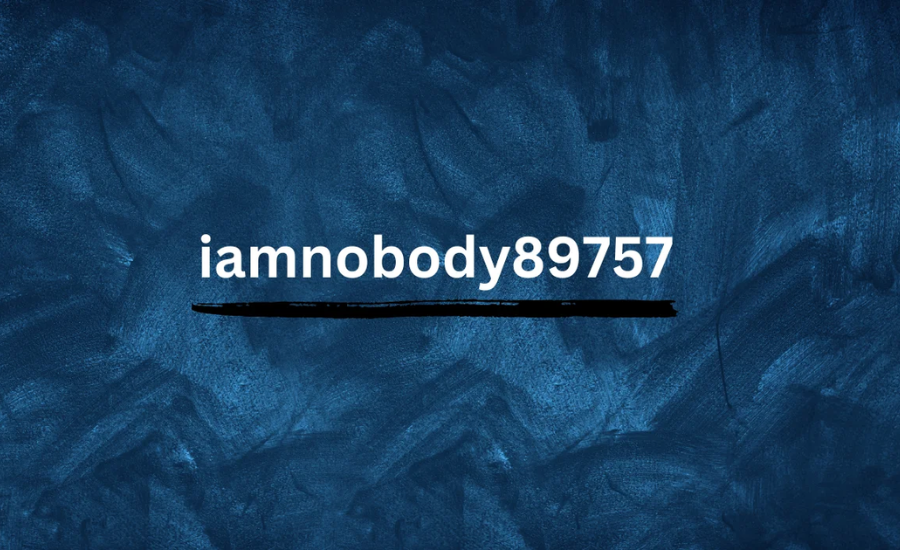In today’s digital era, our identities transcend physical boundaries and immerse into the expansive realm of the internet. Through platforms like social media and online forums, we construct digital personas that mirror our true selves and our aspirations. This digital domain serves as a melting pot where anonymity and self-expression intertwine, where privacy dances with transparency, blurring the lines between the tangible and the virtual.
As a 20-year-old English student navigating this vast digital landscape, I’ve often pondered the significance of online identity, particularly through the lens of the pseudonym “IamNobody89757.” This exploration dives deep into the intricacies of digital identity, unraveling its complexities, navigating its challenges, and embracing the myriad opportunities it offers for personal evolution and creative expression.
The Evolution Of Online Identity
In the nascent stages of the internet, anonymity reigned supreme. Users embraced screen names and aliases as they ventured into the digital realm, relishing the freedom to explore and engage without the weight of societal judgment or consequences. However, the advent of social media platforms heralded a transformative shift. Online profiles became intrinsically tied to real-life identities, blurring the once distinct boundaries separating our digital personas from our offline selves.
Fast forward to today, and the concept of pseudonymity emerges as a nuanced compromise in this evolving digital landscape. Illustrated by the likes of “IamNobody89757,” pseudonymity strikes a delicate balance. It allows individuals to express themselves authentically while retaining a veil of privacy. This concept acknowledges the desire for genuine self-expression while also respecting the need for personal boundaries and discretion in the online sphere.
The Significance Of “IamNobody89757”

The pseudonym “IamNobody89757” captivates with its intriguing paradox, boldly asserting both individuality and anonymity. It serves as a testament to the desire for recognition of one’s uniqueness while embracing the fluidity inherent in digital identity. Similar to numerous online pseudonyms, it functions as a protective veil, shielding the essence of the true self from scrutiny while facilitating unrestricted self-expression.
Beneath the cloak of anonymity lies a profound revelation: within the boundless expanse of cyberspace, we are simultaneously somebody and nobody. Each individual, hidden behind their chosen pseudonym, contributes to the collective tapestry of online existence, yet remains elusive in their true essence. This duality underscores the intricate interplay between self-representation and concealment in the digital realm, inviting contemplation on the multifaceted nature of identity in the age of technology.
Identity Exploration In The Digital Realm
Exploring online identity proves to be a journey filled with both liberation and trepidation. Anonymity, on one hand, presents a canvas devoid of societal constraints, allowing us to craft digital representations free from the shackles of expectations. However, it also sparks introspection about authenticity and accountability. The challenge arises in reconciling the personas we cultivate online with the essence of our true selves. Striking a balance between privacy and transparency becomes paramount as we navigate this intricate terrain.
The emergence of online communities adds yet another layer of complexity to the equation. These virtual realms offer solace, fostering connections in an increasingly fragmented world. Yet, within these digital havens lurk inherent risks. Echo chambers perpetuate narrow perspectives, fostering an environment ripe for toxicity. Divisiveness and hostility can thrive, fracturing the unity that online communities strive to cultivate. Thus, while these virtual spaces offer belonging, they also demand vigilance in safeguarding against the pitfalls of polarization and exclusion.
Embracing Authenticity In The Digital Age

Amid the cacophony of the digital realm, authenticity emerges as a guiding light, illuminating the path forward. It stands as a beacon of truth, calling upon us to embrace vulnerability and courageously reveal our true selves to the world. Authenticity beckons us to accept our flaws and imperfections, recognizing that it is perfectly okay to be imperfect. In a culture often fixated on likes and followers, authenticity becomes a revolutionary act of self-love and acceptance.
Yet, authenticity is not a passive state; it requires conscious effort and intentional action, particularly in the digital landscape saturated with filters and facades. It necessitates a cultivation of self-awareness and mindfulness in our online interactions, urging us to remain steadfast in our values and beliefs despite external pressures. Authenticity invites us to peel back the layers of pretense and reveal our genuine selves, fostering deeper connections and meaningful relationships in the digital world.
Navigating Identity Challenges Online
Navigating the realm of online identity presents its fair share of obstacles. Cyberbullying and online harassment loom as ever-present dangers, casting dark shadows across the digital landscape. The cloak of anonymity bestowed by the internet empowers individuals to engage in behaviors they would hesitate to undertake in real life, resulting in profound pain and devastation for their targets.
Nevertheless, amidst these challenges, there exists a glimmer of hope. Online communities have the potential to serve as beacons of support and solidarity, offering safe havens for individuals to share their narratives and discover kinship in shared experiences. By cultivating a culture rooted in empathy and understanding, we have the power to cultivate a digital realm that is more inclusive and compassionate, where every voice is valued and every individual is embraced.
Cultivating A Positive Online Persona
At the heart of navigating online identity lies the cultivation of a positive digital persona—one that mirrors our core values, passions, and aspirations. This endeavor transcends the pursuit of a flawless image or external validation. Instead, it revolves around seizing control of our narrative and leveraging our digital platform to instill inspiration and empowerment in those we encounter.
This endeavor demands authenticity, consistency, and integrity. It entails a commitment to remaining true to ourselves, even when faced with discomfort or inconvenience. It requires us to present our most genuine selves, not to seek the approval of others, but to fulfill our intrinsic sense of purpose and fulfillment.
Harnessing The Power Of Community
One of the most significant advantages of the digital era is its capacity to foster connections among individuals, transcending geographical and cultural barriers. Online communities emerge as pivotal agents of transformation, enabling individuals to amplify their voices and enact impactful change on a global scale.
Harnessing the power of community, we unlock our collective strength to address pressing issues and drive positive social transformation. Whether it involves raising awareness for critical causes or mobilizing support for marginalized groups, our digital networks possess the potential to serve as formidable forces for good, catalyzing meaningful change and fostering a more equitable and compassionate world.
Balancing Privacy And Transparency

As we traverse the digital terrain, striking a delicate equilibrium between privacy and transparency emerges as paramount. While anonymity may provide a shield of security and liberation, it’s imperative to acknowledge its inherent constraints. Without accountability, our actions hold the potential for unintended repercussions, perpetuating harm and injustice within the digital sphere.
Conversely, transparency carries its own set of risks. As we divulge more of ourselves online, the vulnerability to exploitation and abuse escalates. Thus, exercising prudence and discretion in our virtual engagements becomes imperative. Establishing clear boundaries and safeguarding our personal information from prying eyes serve as essential safeguards in navigating the digital landscape responsibly.
Empowering Self-Expression
Ultimately, the journey of navigating online identity revolves around empowering self-expression—a journey of discovering our unique voice and leveraging it to effect meaningful change. Whether through mediums like blogging, vlogging, or social media activism, each of us holds the power to shape our digital narrative and leave a lasting imprint on those within our sphere of influence.
Yet, alongside this power comes a profound responsibility. As digital citizens, it is incumbent upon us to wield our platforms judiciously, cognizant of the profound impact our words and actions can have on others. By leading with empathy and integrity, we possess the ability to cultivate a digital realm that not only embraces diversity but also fosters genuine connections, empowering individuals to authentically express themselves and contribute to a more inclusive and compassionate online community.
FAQs
Q: What is digital identity?
Digital identity consists of the online personas we create and maintain, such as social media profiles, forum aliases, and other digital representations. It includes our interactions, self-expressions, and the information we share online.
Q: How has online identity evolved over time?
Initially, the internet allowed for anonymity, enabling users to explore and interact without revealing their true identities. With the advent of social media, online identities have increasingly merged with real-life identities, blending our digital and offline personas.
Q: What is the significance of pseudonyms like “IamNobody89757”?
Pseudonyms such as “IamNobody89757” enable users to maintain privacy while expressing themselves authentically. They highlight the dual desire for individuality and the anonymity that the digital space provides.
Q: What are the benefits of online anonymity?
Online anonymity offers a safe space for free expression, allowing individuals to explore their identities without fear of judgment or repercussions. It can foster more open and honest interactions.
Q: What challenges come with online anonymity?
Challenges include the potential for cyberbullying and harassment, as anonymity can embolden harmful behavior. It also raises concerns about authenticity and accountability.
Conclusion
The digital age has revolutionized how we shape and showcase our identities. Online personas, like the pseudonym “IamNobody89757,” provide a platform for unique self-expression that transcends traditional boundaries. This blend of anonymity and authenticity offers both advantages and challenges.
Anonymity online can safeguard privacy, fostering uninhibited expression. However, it also raises concerns about accountability and authenticity. Navigating this digital landscape requires a delicate balance between privacy and transparency and between authenticity and discretion.
Online communities serve as hubs for connection and support, driving positive change. By fostering empathy and understanding, we can create a digital environment that celebrates diversity and fosters genuine connections. Ultimately, our digital identities reflect our true selves. Leading with empathy and integrity empowers us to make meaningful contributions online, shaping a space of growth and positivity for all.
stay in touch for latest more updates and alerts. Pudelek!
